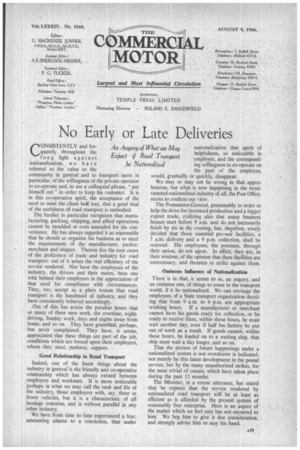No Early or Late Deliveries
Page 21

If you've noticed an error in this article please click here to report it so we can fix it.
CONSISTENTLY and frequently throughout the long fight against nationalization, we have referred to the value to the community in general and to transport users in particular, of the willingness of the private operator to co-operate and, to use a colloquial phrase, " put himself out" in order to keep his customer. It is in this co-operative spirit, the acceptance of the need to meet the client half way, that a good deal of the usefulness of road transport is embodied.
The haulier in particular recognizes that .manu. facturing. packing, shipping, and allied operations cannot be moulded or even amended for his convenience. He has always regarded it as reasonable that he should so organize his business as to meet the requirements of the manufacturer, packer, merchant and shipper. Therein lies the root cause ' of the preference of trade and industry for road transport: out of it arises the real efficiency of the service rendered. Nor have the employees of the industry, the drivers and their mates, been one whit behind their employers in the appreciation of that need for compliance with circumstances. They, too, accept as a plain truism that road transport is the handmaid of industry, and they have consistently behaved accordingly.
Out of this has arisen the peculiar hours that so many of these men work, the overtime, nightdriving, Sunday work, days and nights away from home, and so on. They have grumbled, perhaps, but never• complained. They have, it seems, appreciated that these things are part of the job, conditions which arc forced upon their employers, whom they must, perforce, support.
Good Relationship in Road Transport Indeed, one of the finest things about the industry in general is the friendly and co-operative relationship which has always existed between employers and workmen. It is more noticeable perhaps in what we may call the rank and file of the industry, those employers with, say. three or fewer vehicles, but it is a characteristic of all haulage concerns, and is without parallel in any other industry.
We have from time to time experienced a fear, amounting almost to a conviction, that under nationalization that spirit of helpfulness, so noticeable in employer, and the corresponding willingness to co-operate on the part of the employee, would, gradually or quickly, disappear.
We may or may not be wrong in that apprehension, but what is now happening in the mostvaunted nationalized industry of all, the Post Office. seems to confirm our view..
The Postmaster-General, presumably in order to help the drive for increased production and a bigger export trade, realizing also that many business houses start before 9 a.m. and do not necessarily finish by six in the evening, has, therefore, wisely decided that those essential pre-war facilities, a 7 a.m. delivery and a 9 p.m. collection, shall be restored. His employees, the postmen, through their union, do not agree. In effect, they are, in their wisdom, of the opinion that these facilities are unnecessary, and threaten to strike against them.
Ominous Influence of Nationalization There is in that, it seems to us, an augury, and an ominous one, of things to come in the transport world, if it be nationalized. We can envisage the employees of a State transport organization deciding that from 9 a.m. to 4 p.m. are appropriate working hours. If a manufacturer or merchant cannot have his goods ready for collection, or be ready to receive them, within those hours, he must wait another day, even if half his factory be put out of work as a result. If goods cannot, within these hours, be loaded on to a waiting ship, that ship must wait a day longer, and so on.
That the picture of future happenings under a nationalized system is not overdrawn is indicated, not merely by this latest development in the postal service, hut by the many unauthorized strikes, for the most trivial of causes, which have taken place during the past 12 months.
The Minister, in a recent utterance, has stated that he expects that the service rendered by nationalized road transport will be at least as efficient as is afforded by the present system of reasonably free enterprise. Here is an aspect of the matter which we feel sure has not occurred to him. We beg him to give it due consideration, and strongly advise him to stay his hand.




































































